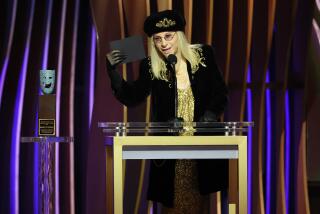Meisner Taught Great Actors Their Craft
- Share via
In a 1990 televised tribute on “American Playhouse,” Sanford Meisner expressed a simple and concise definition of acting.
“Acting is doing,” he told a student. “Meaningful acting is doing under emotional circumstances.”
An original member of the renowned Group Theatre collective in New York during the 1930s, Meisner was for more than 50 years considered by theater and film experts one of the country’s top acting teachers, part of a circle that included Lee Strasberg, Stella Adler and Elia Kazan.
Born in 1905 in Brooklyn to Jewish Hungarian immigrants, Meisner was the eldest of four children. In a childhood marred by anti-Semitism and the death of a younger brother, Meisner retreated into a fantasy world of books, daydreams and piano performances. A Juilliard School dropout, Meisner turned to the Broadway stage, getting his first role in 1924.
During Meisner’s Group Theatre stint, he studied acting techniques based on a revolutionary system created by Konstantin Stanislavsky for the Moscow Art Theatre.
After a 20-year teaching career at Manhattan’s Neighborhood Playhouse, Meisner moved to Hollywood in 1958 to train young actors for 20th Century Fox. However, after disputes with studio executives over his methods, Meisner returned to New York and the Neighborhood Playhouse in 1961.
Despite serious health problems in later life, Meisner trained generations of actors, playwrights and directors whose ranks include Dustin Hoffman, Suzanne Pleshette, John Frankenheimer, Gregory Peck and Joanne Woodward, among others.
Meisner eventually returned to the region in 1987, creating the Meisner Carville School of Acting in Studio City as well as North Hollywood’s Sanford Meisner Center for the Arts in 1995.
Respected and admired by film and theater actors alike, Meisner continued to train young thespians up to his death at age 91 in February in Sherman Oaks.
More to Read
The biggest entertainment stories
Get our big stories about Hollywood, film, television, music, arts, culture and more right in your inbox as soon as they publish.
You may occasionally receive promotional content from the Los Angeles Times.










